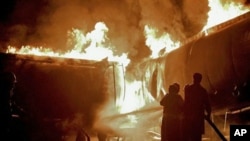The Pakistani Taliban says it is responsible for an early Monday morning attack on a supply convoy bound for Afghanistan. About 20 tankers were torched in a pre-dawn attack, just outside the Pakistani capital, killing at least three people.
Pakistan's homegrown Taliban group, Tehrik-i-Taliban, says its members attacked a NATO convoy inparked at a major oil refinery facility on the outskirts of Islamabad early Monday morning.
Riaz is a Pakistani truck driver who was part of the convoy, which was destined for NATO and U.S. forces fighting in Afghanistan. He told VOA that he and most of his fellow drivers were asleep as they waited for a chance to refuel when suddenly the attack began.
Riaz said the attackers shouted "God is great! God is great!" as they set vehicles on fire. He and the other drivers started running around, trying to escape, said Riaz. The drivers could not see the attackers because there was no electricity and it was completely dark.
A Pakistani Taliban spokesman told reporters the attacks would continue until the supply convoys are no longer running. The militant group also said it was avenging drone strikes on Pakistani territory.
Later Monday, officials say two gunmen launched a deadly attack on a NATO convoy in the southwestern province of Baluchistan, setting two trucks on fire. It is unclear if the attacks are related.
There have been several attacks on NATO convoys in Pakistan since Islamabad closed one of its northwestern border crossings last week, following a NATO cross-border raid that Pakistan says killed three of its soldiers in the Kurram region.
NATO says its forces were pursuing militants out of self defense when its helicopters crossed the border into Pakistan on Thursday. A joint investigation is under way.
NATO Secretary-General Anders Fogh Rasmussen met with Pakistani Foreign Minister Shah Mehmood Qureshi in Brussels Monday about the incident. He said the alliance regrets the soldiers' deaths and he urged Pakistan to reopen the supply route as soon as possible.
Qureshi reiterated his government's position while appearing on a private Pakistani news channel after the talks. Pakistan wants to continue its cooperation with NATO and does not want to block the convoys, he said. But he added the Pakistani government will not cooperate at the cost of the violation of its borders or the attacking of its military outposts. That, Qureshi said, is unacceptable.
The Pakistani government officially maintains it closed the border crossing for security reasons. On Sunday, Pakistan's ambassador to the United States indicated the supply route would reopen this week.
The border crossing along the Khyber Pass is on one of the main NATO supply routes through Pakistan into Afghanistan.














